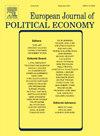国际货币基金组织支持的项目对性别不平等的影响
IF 2.4
3区 经济学
Q2 ECONOMICS
引用次数: 0
摘要
宏观经济波动往往导致可能对弱势群体产生不成比例影响的政策。一些经济体通过国际货币基金组织支持的改革方案来解决疲弱的经济基本面问题,这些方案已被证明会影响性别不平等。然而,要准确评估项目的效果,就需要充分匹配的反事实:如果没有这个项目,这个国家的性别差异会如何演变?我们分析了125个imf支持的项目(1994-2022年),使用了与每个imf支持项目国家的性别/经济趋势(包括财政支出、债务和储备)相匹配的定制对照组。对于大多数国家,我们不能拒绝imf支持的项目对性别不平等没有影响的零假设,因为观察到的性别结果与那些财政支出、债务和储备轨迹相似但没有项目的对照国家没有统计学上的显著差异。本文章由计算机程序翻译,如有差异,请以英文原文为准。
Effects of IMF-supported programs on gender inequality
Macroeconomic volatility often entails policies that may disproportionately impact vulnerable populations. Some economies address weak economic fundamentals with IMF-supported reform programs, which have been shown to impact gender inequality. To accurately evaluate program effects, however, requires well-matched counterfactuals: How would gender disparities have evolved in the country in the absence of the program? We analyze 125 IMF-supported programs (1994–2022) using custom-tailored control groups that match each IMF-supported program country's gender/economic trends, including fiscal spending, debt, and reserves. For most countries, we cannot reject the null hypothesis that IMF-supported programs have no effect on gender inequality, as the observed gender outcomes were not statistically significantly different from those in controls with similar fiscal spending, debt, and reserves trajectories but no programs.
求助全文
通过发布文献求助,成功后即可免费获取论文全文。
去求助
来源期刊

European Journal of Political Economy
Multiple-
CiteScore
3.40
自引率
10.00%
发文量
106
期刊介绍:
The aim of the European Journal of Political Economy is to disseminate original theoretical and empirical research on economic phenomena within a scope that encompasses collective decision making, political behavior, and the role of institutions. Contributions are invited from the international community of researchers. Manuscripts must be published in English. Starting 2008, the European Journal of Political Economy is indexed in the Social Sciences Citation Index published by Thomson Scientific (formerly ISI).
 求助内容:
求助内容: 应助结果提醒方式:
应助结果提醒方式:


